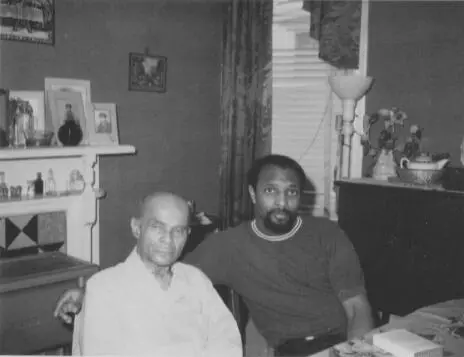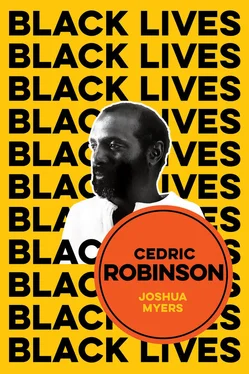In retelling this story days after Robinson’s transition, Robin D. G. Kelley reminded us that Cap’s influence registered in Cedric’s commitment to understanding not only the historical and political realities of the Black experience but also its spiritual meaning – for this is how he also understood those conditions of Black existence. Kelley writes that it was Cap who represented the “personal dignity, discipline, quiet intelligence, spiritual grounding, courage, and commitment to family and community” that served as the foundation for that alternative tradition, what Cedric would characterize in his conception as “the Black Radical tradition.” 5What he would write of the radical intelligentsia was also true of his own life. This was a tradition that was “all around” him, present in the midst of his people – in their search for a level of autonomy in Mobile, in their migration to Oakland, in the community they forged in their churches and neighborhoods, in their common pursuit of knowing, and in the love they produced out of what may have seemed a kind of nothingness. 6In times of trouble and in moments of joy, this was their ontological totality. The horizons of the possibility of a Black Radical tradition constituted a theme that Cedric would pursue throughout his intellectual work, but perhaps nowhere more beautifully than in the conclusion to Black Movements in America , where in a note of resolution he honors “the continuity of Afro-Christian belief and vision … with them it is always possible that the next Black social movement will obtain that distant land, perhaps even transporting America with it.” 7

Figure 1.1Cedric Robinson with Winston Whiteside
Image courtesy of Elizabeth Robinson
All around him were these people, his people. They know that life, Black being, had required struggle. Their faith was the warrant for extending that tradition. One did not have to see what the end would be. One only had to believe in this collective intelligence that had been gathered from struggle. 8
I can die, but I won’t work
Before landing in Oakland, the Whitesides had already embarked upon a remarkable journey in the post-emancipation South. Cap’s father, Benjamin Whiteside, was born enslaved in 1847 and had migrated to Mobile from Cooper’s Gap, North Carolina after the Civil War. 9Cap’s mother, Clara Mercer, who had been enslaved in Virginia, had also managed to find a new beginning in Mobile, settling in a house with her widowed mother. We do not know the details of the circumstances that led either of them away from the only places they knew to a place that was the dreaded “deeper” South, the destination of many in the domestic slave trade. But Black migrations south after the war were not unheard of as many sought family members from whom they had been separated, while others merely wanted to test the meaning of freedom away from the familiar plantations that had been the source of their exploitation and their pain. 10Mobile became such a space – with its Black population increasing by 65 percent in the years after the war – for many to practice these experiments in freedom. But such experiments were often fraught. In Mobile, as well as other recovering Southern cities, one would not have been able to escape the possibilities of violence and of a kind of class warfare that sought to control and manage the kind of militancy that might presage true societal transformation. 11
In 1870, at the age of nineteen, Clara Mercer married Benjamin Whiteside. Twenty-three years later, Cap was born, becoming the youngest of seven children, amid the erosion of Reconstruction and at the height of Redemption – the Plessy v. Ferguson decision that solidified Jim Crow was handed down a month before his third birthday. Finding work as a drayman in industrial Mobile, Benjamin would soon put enough money aside to secure a family home and open a delivery business. Soon thereafter Clara became a restaurateur, serving home-cooked meals out of an adjacent property on N. Jackson Street. As Mobile’s harbor activities recovered from the war, this growing Black population became a source of the necessary labor force required to make the port city attractive to international capital.
Throughout the 1870s, the Black population would struggle to consolidate the political power that manifested as a possibility during Reconstruction. In Mobile, this meant an intra-racial battle between an elite, moderate wing, often aligned with the “radical Republicans” and a mass-based militant assertion of self-determination that struggled to find a political footing within the Republican Party (which often meant alliances with the Democrats). This latter element included working-class freedmen, such as draymen like Benjamin Whiteside, who went on strike in 1867 to demand fairer treatment. 12In cases where that militant segment did find its political voice in the Republican Party, with prominent personas like Lawrence Berry and Alexander Allen, their political maneuvering often went awry, with many living out their last years in public disgrace. Berry turned to alcohol, and committed suicide, with the encouragement of the white press, while Allen ended up in jail on murder charges after a mob descended upon a bar he owned. He would perish while incarcerated. Years of harassment and ridicule were the costs for advocating for the Black poor in Mobile. 13Their deaths were part of a campaign of racial terror. It was defined by cases like that of elderly Black leader and minister Sam Gaillard who, after being sent to a chain gang for refusing to be degraded and referred to as “boy,” subsequently refused to work and was shot down after uttering the last words, “I can die, but I won’t work.” 14In response, other leaders counseled moderation, a tactic to defuse the situation. A Republican paternalism directed the city’s part in Reconstruction. But it was, perhaps predictably, a moderation that was still too much for the white supremacist assumptions that informed Democratic power.
With Reconstruction and Black political leadership undermined through white violence and greed by the mid-1880s, a Black business class emerged situating itself along Davis Avenue in the Seventh Ward. A détente with Jim Crow, however, led some of them to adopt the self-help, apolitical posture of Booker T. Washington. But arguably this class – only representative of about 1 percent of the population – was not the true foundation of Black life in Mobile. The richer valences of Blackness resonated in the cultural and social lives of the masses who lived a rougher material existence that was nevertheless replenished by a deep spiritual well. On the occasion of a funeral, the community of Samaritans, a social order, would appear for the public ceremony in all-white, with “white broad-brimmed hats with long white veils,” a rite reminiscent of African pasts not long past. 15Death, even under the hard circumstances of life in the early days of Jim Crow, was a time to fortify bonds and togetherness. Like the churches and other social organizations, the creation of community-based and service-oriented businesses was also grounded in this pursuit of a measure of autonomy, care, and protection. It was necessary in conditions where the exploitative realm, the requirements of capital’s expansion, was both grossly unfair and often deadly. While such a business class, even those who were political, could not fully negate the political and economic conditions that placed the vast majority at the behest of capital, they were part of a community ethic that was critical to the Black community’s sense of order. 16
Читать дальше













